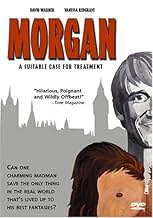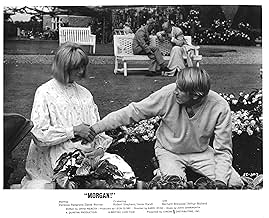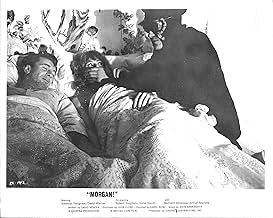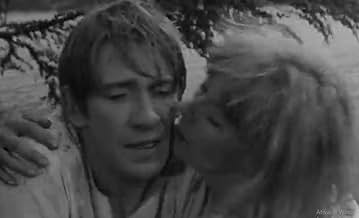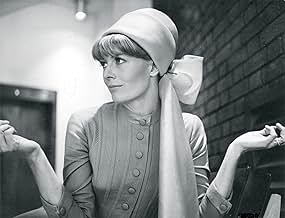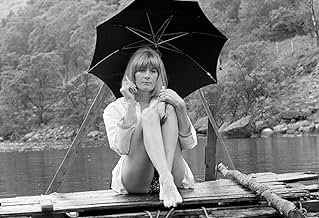IMDb RATING
6.5/10
2.2K
YOUR RATING
After his wife leaves him for his former best friend, a failed London artist begins his descent into madness in trying to win her back.After his wife leaves him for his former best friend, a failed London artist begins his descent into madness in trying to win her back.After his wife leaves him for his former best friend, a failed London artist begins his descent into madness in trying to win her back.
- Nominated for 2 Oscars
- 4 wins & 12 nominations total
Angus MacKay
- Best Man
- (as Angus Mackay)
Jack Armstrong
- Guest at Wedding Reception
- (uncredited)
Bernard Barnsley
- Workman
- (uncredited)
- Director
- Writer
- All cast & crew
- Production, box office & more at IMDbPro
Featured reviews
There aren't too many whimsical comedies with a Trotskyite sub text, so for that alone let us give thanks, but there's a whole lot more to enjoy here. Vanessa Redgrave for one, looking wonderful as the posh girl who dumps her eccentric husband in favour of stability, shows a real gift for light comedy, Karel Reisz's direction is always inventive and makes good use of inserts from King Kong and Tarzan, and then there's the world's most wonderful couple: Arthur Mullard and Irene Handl.
Warner's performance as Morgan depends how you feel about children who refuse to grow up, though he does become more sympathetic eventually. The Trotsky element comes from writer David Mercer, a renowned playwright and communist of the day and though class figures prominently in the film, it is never didactic. The screenplay is based on a TV play he'd wrote and in a unusual reversal of roles was watered down somewhat for the cinema. The ending turns into the full-blown surrealism that always threatened and there's a great, almost-last line from the Morgan himself: "I've gone all furry".
Warner's performance as Morgan depends how you feel about children who refuse to grow up, though he does become more sympathetic eventually. The Trotsky element comes from writer David Mercer, a renowned playwright and communist of the day and though class figures prominently in the film, it is never didactic. The screenplay is based on a TV play he'd wrote and in a unusual reversal of roles was watered down somewhat for the cinema. The ending turns into the full-blown surrealism that always threatened and there's a great, almost-last line from the Morgan himself: "I've gone all furry".
A film that acheives what it sets out to be. It is an immature and unreasonable storyline that takes no account for anyones feelings but those of our hero, Morgan... But 1966 was a time of big brush strokes, not subtle pointers. Most of the situations and characters are cardboard and stereotypical, but done with a sense of style and flair that allows you not to get bogged down in it all. When at the end of the film, the seemingly battered and beaten Morgan still has the clenched fist of rebellion, it's time for a hot cocoa and then off to bed clutching Das Kapital in your rebellious mitts, with a wistful smile on your face for the simple values of yesteryear, when it was good versus evil. I gave it 9 0ut of 10. Very watchable and great fun
I've always had something of an ambivalent attitude towards the British "Swinging London" films of the 1960s: sometimes I enjoy their creative technique and anything-goes approach, while other times I find their brashness exasperating and extremely dated. Actually, MORGAN is now among the films I've revisited the most among them (more by accident than design) which has led me to toy with the idea of compiling a list of titles from that era - comprising above all films I've watched only once, or not at all, but also those which I haven't checked out in ages (some of which are in my endless "DVDs To Watch" pile).
Anyway, the film itself is certainly one of the most engaging of the lot: basically an update of the typical Hollywood 'screwball comedy' formula, with one member of a divorced couple disrupting the new marriage plans of the other, though here we don't get the conventional happy ending. Reisz was, along with Lindsay Anderson and Tony Richardson, one of the founding members of the "Free Cinema" movement; though he started at the very top with Saturday NIGHT AND Sunday MORNING (1960), the rest of his career was rather spotty with MORGAN being perhaps its closest in quality - even if the unflinching realism of the former had, by this time, given way to irreverent comic fantasy!
While the plot is somewhat thin and the lead character's pranks to reclaim his wife become repetitive, the film's hectic pace never wavers; stylish, amusing (particularly when dealing with Morgan's Communist background and his obsession with gorillas!) and bolstered by John Dankworth's playful score, it's delightfully enacted by the three principals - David Warner (the role of his life), Vanessa Redgrave (the recipient of many accolades, including a surprising Best Actress Oscar nomination) and Robert Stephens - none of whom are typically associated with slapstick (though David Mercer's script also offers perceptive comments about the painful consequences of a broken marriage).
Anyway, the film itself is certainly one of the most engaging of the lot: basically an update of the typical Hollywood 'screwball comedy' formula, with one member of a divorced couple disrupting the new marriage plans of the other, though here we don't get the conventional happy ending. Reisz was, along with Lindsay Anderson and Tony Richardson, one of the founding members of the "Free Cinema" movement; though he started at the very top with Saturday NIGHT AND Sunday MORNING (1960), the rest of his career was rather spotty with MORGAN being perhaps its closest in quality - even if the unflinching realism of the former had, by this time, given way to irreverent comic fantasy!
While the plot is somewhat thin and the lead character's pranks to reclaim his wife become repetitive, the film's hectic pace never wavers; stylish, amusing (particularly when dealing with Morgan's Communist background and his obsession with gorillas!) and bolstered by John Dankworth's playful score, it's delightfully enacted by the three principals - David Warner (the role of his life), Vanessa Redgrave (the recipient of many accolades, including a surprising Best Actress Oscar nomination) and Robert Stephens - none of whom are typically associated with slapstick (though David Mercer's script also offers perceptive comments about the painful consequences of a broken marriage).
This movie was funny as hell. David Warner is an ace-- a great comedic actor, and the entire cast should have received awards. All the ingredients for a great comedy were there-- gorilla suits, slapstick comedy at a wedding celebration involving a gorilla, the main character being insane-- what more could you ask for. I saw the movie on late night t.v. and I rolled out of bed laughing.
An uncredited actor who also did an outstanding job in this movie was Billy Reil, playing the part of inspector Kowalski. It was especially funny when he thought the bad guy was heading for his office and he ended up konking his secretary over the head with a flower pot.
An uncredited actor who also did an outstanding job in this movie was Billy Reil, playing the part of inspector Kowalski. It was especially funny when he thought the bad guy was heading for his office and he ended up konking his secretary over the head with a flower pot.
Although a classic cult film of the 60's, this film, when studied properly, has its definite faults.
David Warner is one of my favourite actors. He often appears in minor roles nowadays and gives the leads great support with his excellent performances, and his position down the cast list does enable him to be offered a wide range of characters. However, this has caused him to be one of the most underrated actors around today and unlike his English equivalents (John Hurt, Ian Holm, etc.) he has never been really appreciated enough by those outside the UK. It was with great interest, therefore, that I was given a chance to see one David Warner's first films after "Tom Jones" (1963), "Morgan, A Suitable Case for Treatment," a film adapted from a television play by writer David Mercer, in which Warner takes for the only time in his career, the definite title role in a movie, starring alongside then-first-timer Vanessa Redgrave.
Warner plays Morgan Delt, a barely sane man who has just had a divorce from his beautiful wife, Leonie (Redgrave), much to his secret dismay. As a consequence, Morgan begins to sabotage Leonie's second marriage to his former-best-friend Charles Napier (Robert Stephens), attempting various types of distractions which are characteristic of the man himself. He plays sounds from records to disturb the couple at dinner, re-wires Leonie's house, dresses up as a gorilla, and even plants bombs during a brief visitation from Leonie's mother. Soon he begins to dream, mostly about his obsession with gorillas but also of his mock execution, he believes himself to not only to be insane but also illegal.
This depiction of madness, however, barely works at all, the adaptation of this story from television to screen being probably the main reason for it. The acting is fine, Redgrave is brilliant and Warner, perfectly cast for once in his career, is superb, the supporting cast are also impressive, including a nice cameo from actress Irene Handl as Morgan's mother, it's just that the film doesn't quite work. "A Suitable Case for Treatment" does have some hilariously funny moments which are highly memorable in fact, but the film as a general whole doesn't succeed. See it if you can, but expect some disappointment.
Warner plays Morgan Delt, a barely sane man who has just had a divorce from his beautiful wife, Leonie (Redgrave), much to his secret dismay. As a consequence, Morgan begins to sabotage Leonie's second marriage to his former-best-friend Charles Napier (Robert Stephens), attempting various types of distractions which are characteristic of the man himself. He plays sounds from records to disturb the couple at dinner, re-wires Leonie's house, dresses up as a gorilla, and even plants bombs during a brief visitation from Leonie's mother. Soon he begins to dream, mostly about his obsession with gorillas but also of his mock execution, he believes himself to not only to be insane but also illegal.
This depiction of madness, however, barely works at all, the adaptation of this story from television to screen being probably the main reason for it. The acting is fine, Redgrave is brilliant and Warner, perfectly cast for once in his career, is superb, the supporting cast are also impressive, including a nice cameo from actress Irene Handl as Morgan's mother, it's just that the film doesn't quite work. "A Suitable Case for Treatment" does have some hilariously funny moments which are highly memorable in fact, but the film as a general whole doesn't succeed. See it if you can, but expect some disappointment.
Did you know
- TriviaVanessa Redgrave's Best Actress Oscar nomination for this movie coincided with sister Lynn Redgrave's similar nomination for Georgy Girl (1966). Such a coincidence had occurred only once before when sisters Joan Fontaine and Olivia de Havilland respectively vied for the Best Actress Oscar for Soupçons (1941) and Par la porte d'or (1941).
- GoofsCrew reflected in the window of the car that Leonie gets into at the start of the film.
- Quotes
Morgan Delt: [to Leoni] Do you really want little Napiers growing inside you?
- ConnectionsEdited from King Kong (1933)
- How long is Morgan!?Powered by Alexa
Details
- Runtime
- 1h 37m(97 min)
- Color
- Aspect ratio
- 1.66 : 1
Contribute to this page
Suggest an edit or add missing content


